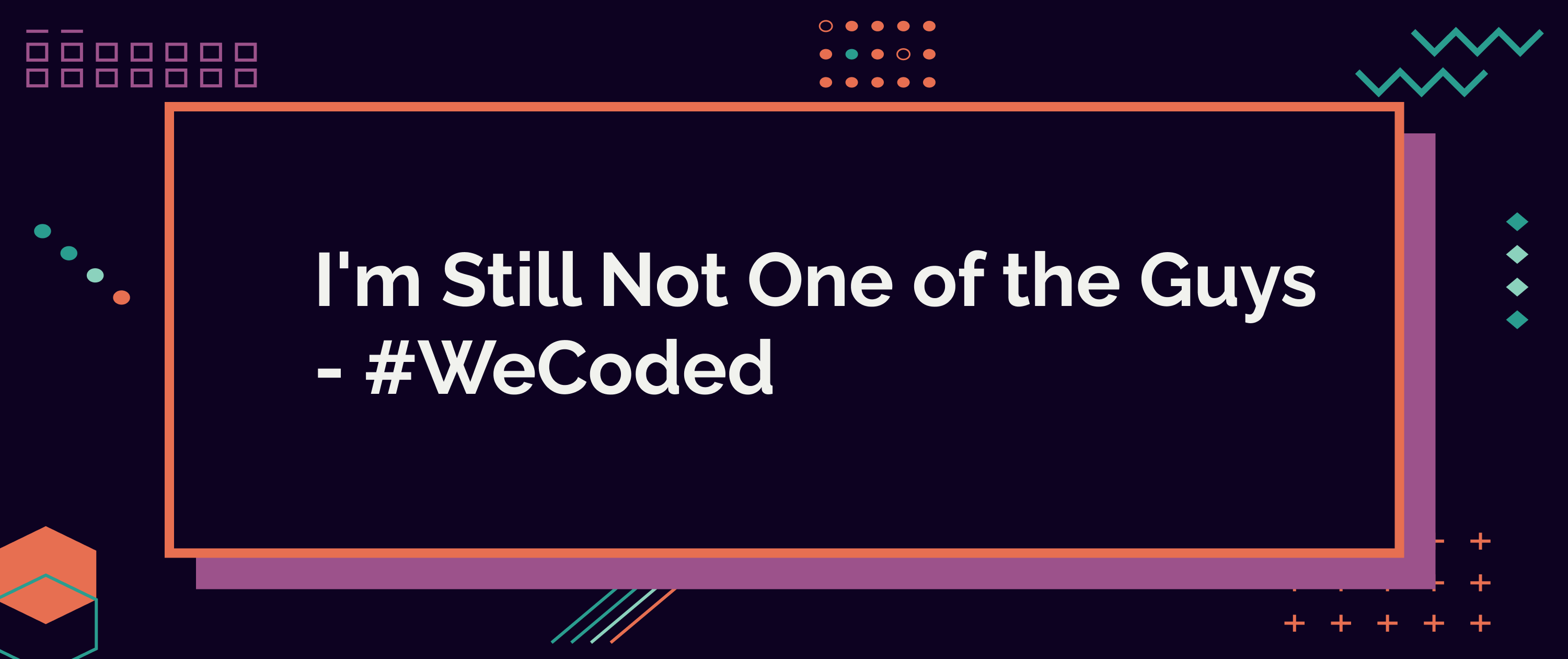I'm Still Not One of the Guys
Reading time: about 4 minutes
Published
Originally published in Dev.to.

Nevertheless, Eevis Codes (3 part series)
As #WeCoded is a month-long this year, I'll post a couple of blog posts during this month. This post is the second of these posts.
In 2021, I wrote a blog post called "Why I'm Not One of the Guys" that got a response I didn't expect. When I published it in Dev, it received many comments about how I was wrong to say that the word "guys" is not gender-neutral. I still disagree, but to debate that is not the point of this blog post.
Since then, I've witnessed so many conversations where someone who does not identify as being part of "guys" asked not to be referred to by that word and got a harsh response. They're usually told how wrong they are and that they should just suck it up.
There are a couple of sides to this conversation. People are very protective of the language they're using - and at the same time, the language we use shapes the reality around us. And then there's the thing I keep wondering: if someone says they feel excluded, why is the reaction to tell them that they're wrong and their feelings are not valid?
It's About Language
The words we use matter to us. I've had and followed so many conversations where people try to justify the usage of racist, ableist, sexist, homo-, and transphobic words just because they've been using those words in the past. And this has happened even with people I know who are all in for equality.
And it kind of makes sense - language is a massive part of our identity. And if we use words that cause feelings of exclusion, and someone calls us out on that, it can feel like they're talking about us as persons, not our actions.
But even a well-meaning person can hurt. I often hear the phrase "Assume good intentions", and to some extent, I agree. It would be hard to communicate if others weren't assuming good intentions despite clumsy words. But there's a certain point where we should consider impact over intent.
Language holds a lot of power and can shape the reality around us. One great example is the Swedish gender-neutral pronoun "hen" (in addition to "hon"/she and "han"/he). It was (re)introduced to the Swedish vocabulary in 2012, and it has shaped how people think. (ref: Tavits, M. & Pérez, E. O. - Language influences mass opinion toward gender and LGBT equality)
I've Had to Fight to Get Here - a Personal Perspective
You might wonder why this is so important to me. Why just not let it go?
It's personal. I'm someone from underrepresented genders in tech and who has faced a lot of biased opinions because of my gender. I've seen how big of a role it can play.
I've also tried to be one of the guys. I always felt out of place and that I didn't belong. And now you might mention something about men being different from each other - yes, that's true. But when it comes to "being one of the guys", it usually means just a really small subset of things.
So, I know I've been at a disadvantage throughout my career because of my gender and biases towards it. I've gone through a lot and don't want to hide who I am. I want to be recognized for the gender identity I have. And I'm not one of the guys.
If It's Exclusive for Someone, There are Other Words to Use
If someone comes to you and has the courage to say that the word you're using makes them feel excluded, why not just use another word? Good options are "folks," "all," "everyone," or "team," to name a few.
And I'm not saying that if there is, for example, a group of women (or other genders) who don't have any issues with the word "guys", you can't use it to describe them. The point is about people who feel excluded by using that word.
One last thing I want to mention is microaggressions. They're small actions that communicate some sort of bias towards a minority group. They're often unintentional (but sometimes intentional), like asking someone where they're actually from or calling only male employees to the meeting. If you're interested in reading more, I wrote a blog post "Sometimes I Feel Like I'm Invisible - Experiences of a Woman in Tech" that explains microaggressions a bit more.
Microaggressions are something we, who are minorities in tech, face regularly. Personally, it's often been about actions that subtly suggest that men are better or more important - like being left out of a meeting or when my man-colleague is assumed to know better, even if I'm actually the expert on the topic. Or it's been about the language where men are the default, like with the word "guys".
Wrapping Up
What am I trying to say with this blog post? The gist could be that if someone comes to you and tells you your word choices are exclusive, please listen to them. They're not there to criticize you as a person; it's about the words you use.
And for those of us who face these situations and feel excluded, we have the right to feel what we feel and to be treated in a way that we're not excluded. When we're asking for language that doesn't exclude us, we are right to do so. Let's not let anyone tell us otherwise.